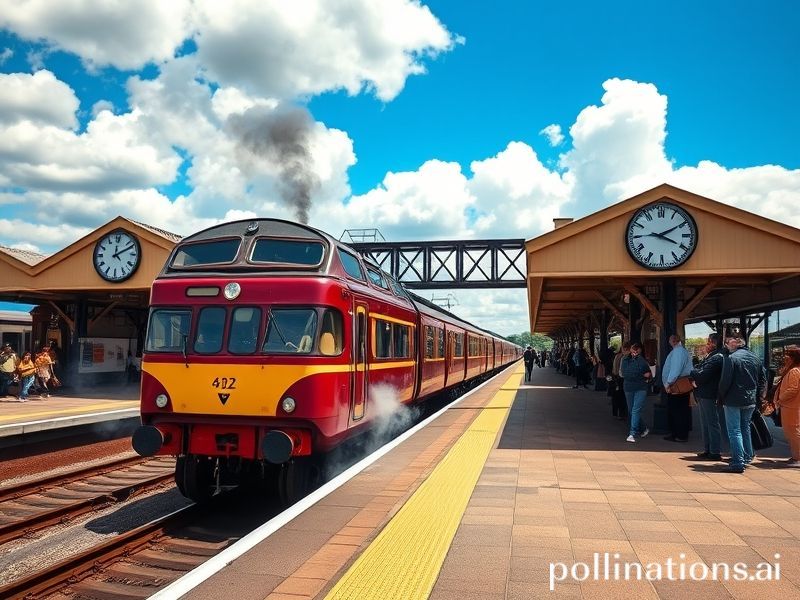Double Decker Trains UK: The Vertical Commute That’s Got the World Looking Up
# **Double Decker Trains UK: The Vertical Commute That’s Got the World Looking Up**
In a world where we’re constantly told to “look up” (usually to avoid walking into lampposts or to spot celebrities), the UK has taken this advice quite literally. Double-decker trains are rolling into stations, and the internet can’t stop gawking. Why? Because nothing says “British ingenuity” like stacking commuters like pancakes on a Sunday brunch buffet.
## **The Vertical Commute Revolution**
The UK’s double-decker trains, operated by companies like South Western Railway, are a sight to behold. Imagine the classic red London bus, but instead of tourists snapping selfies, you’ve got commuters sipping overpriced coffee while staring out of windows at eye level with chimney pots. It’s like a real-life game of Tetris, but with humans and a lot more grumbling about seat reclining.
These trains aren’t just a novelty; they’re a solution to the UK’s chronic overcrowding problem. With cities like London bursting at the seams, double-decker trains offer a clever way to squeeze more passengers into limited space. It’s like the Tube, but with better views and fewer awkward eye contact moments with strangers.
## **Cultural Context: The British Love Affair with Stacking Things**
The British have a long-standing love affair with stacking things. From double-decker buses to tiered wedding cakes, they’ve mastered the art of vertical efficiency. Double-decker trains are just the latest addition to this tradition. It’s as if the UK decided, “Why stop at buses? Let’s take this to the next level and stack our commuters too.”
This trend also taps into the British sense of humor. There’s something inherently amusing about watching people navigate stairs on a moving train while clutching their morning coffee. It’s like a slapstick comedy routine, but with higher stakes (and higher prices for peak travel).
## **Social Impact: A Mixed Bag of Love and Loathing**
Not everyone is thrilled about the double-decker train revolution. While some commuters appreciate the extra space, others are less enthusiastic. The stairs can be a nightmare for those with mobility issues, and the upper deck can feel a bit like a rollercoaster for the vertigo-prone. Plus, let’s not forget the eternal struggle of finding a seat on the lower deck while someone above you drops their bag like a careless skydiver.
Despite the grumbles, the social impact is undeniable. Double-decker trains have sparked conversations about urban planning, accessibility, and the future of public transport. They’ve also given the internet a new meme goldmine. From “double-decker train fails” to “commuter struggles,” the memes are flowing faster than the tea on a morning commute.
## **Why This Topic is Significant**
The double-decker train trend is more than just a quirky news story. It’s a reflection of broader global challenges in urban mobility and infrastructure. As cities around the world grapple with overcrowding, the UK’s experiment with double-decker trains offers a glimpse into potential solutions. It’s a reminder that sometimes, thinking outside the box (or in this case, stacking inside the box) can lead to innovative answers.
Moreover, the trend highlights the power of internet culture in shaping public discourse. What starts as a local transport experiment can quickly become a global talking point, thanks to the viral nature of social media. It’s a testament to how the internet connects us and amplifies even the most niche topics into global phenomena.
## **Conclusion: The Future of Vertical Commuting**
Double-decker trains in the UK are more than just a transport option; they’re a cultural phenomenon. They represent a blend of British ingenuity, humor, and the eternal struggle of urban commuting. Whether you love them or loathe them, one thing is clear: the world is watching, and the future of vertical commuting is looking up—literally.
So, the next time you’re stuck in traffic or crammed into a subway car, take a moment to appreciate the double-decker train. It’s a reminder that sometimes, the solution to our problems is right above us—if we’re willing to take the stairs.







